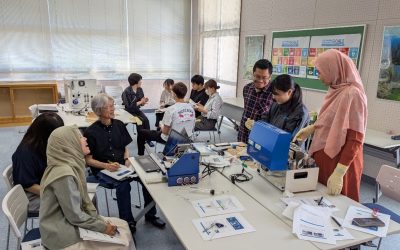SEMARANG – The Faculty of Medicine, Universitas Diponegoro, proudly concluded its highly successful three-day Guest Lecture Series on Molecular Medicine and Scientific Research under the World Class University Inviting Professor Program, held from Monday, October 20th, 2025, through Wednesday, October 22nd, 2025. The series featured renowned expert Professor Flora Tassone, Ph.D., from the Department of Biochemistry and Molecular Medicine, University of California Davis School of Medicine, USA. Prof. Tassone’s lectures provided cutting-edge insights across research methodology, neurogenetic disorders, and advanced diagnostic technologies.
Improving Academic Capacity and Scientific Publication
The opening day, held in the Multipurpose Room of the Prof. Soewondo Building, focused on empowering participants—primarily faculty and postgraduate students—with the skills necessary for academic success. The morning session, “How to Conduct Research for a Good Scientific Publication,” offered practical strategies for designing robust studies. This was followed by the afternoon session, “How to Write a Good Scientific Publication,” which guided attendees through manuscript structure, journal selection, and navigating the peer-review process, equipping them to elevate the quality and impact of their research output.
Exploring Fragile X syndrome and its risks and clinical implications for careers
Day two, also hosted in the Soewondo Building, shifted focus to Prof. Tassone’s core area of expertise in neurogenetics. The morning topic, “From Gene to Synapse: The Molecular Cascade of Fragile X Syndrome,” provided a deep dive into how transcriptional and translational dysregulation contribute to the FMR1-associated disorders. In the afternoon, the discussion was updated with “Fragile X Syndrome and Premutation-Associated Conditions: An Update,” reviewing the latest clinical findings, therapeutic approaches, and the complexities of premutation carriers, providing crucial context for local clinical and genetic researchers.
Exploring Diagnostic Technology and Biomarkers for Genetic Diseases
The final day of lecture series expanded into molecular diagnosis, with a change of venue reflecting the broader scientific audience. The morning session, “Molecular Technology for Diagnosis and Biomarkers,” held at the AP Building of the Faculty of Science and Mathematics, explored state-of-the-art laboratory techniques for identifying disease markers. The series concluded in the afternoon at the Department of Pediatrics with a specialized lecture on the “Molecular Diagnosis of DiGeorge Syndrome,” offering a comprehensive case study on applying molecular techniques to a common genetic condition and emphasizing the importance of accurate, early detection in clinical practice.
Strengthen Collaboration in Autism, Fragile X Syndrome and Associated Conditions and DiGeorge Syndrome
The last day of visit, discussion with the Dean and Vice Dean of Academic and Research was such a fruitful discussion regarding past and also future research collaboration with the member group of Center for Biomedical Research and Community Genetic Research Center in the Dean Office. Cohort study among individual with Fragile X syndrome and associated conditions in Flores Island and DiGeorge syndrome study will be another join research in the future. With regard to our new advanced genetic machine (Sanger Sequencing), Prof Flora Tassone is willing to do some confirmation testing to make sure the testing for Fragile X syndrome will be done for research and services.
UNDIP’s Commitment to World-Class Medical Research
The 2025 Guest Lecture Series was a resounding success, drawing enthusiastic attendance across all three days from students, academics, and medical practitioners. The comprehensive scope—bridging the gap between fundamental research skills and advanced molecular diagnostics—reinforced Universitas Diponegoro’s commitment to fostering a world-class environment for medical education and research. We thank Prof. Tassone for sharing her invaluable expertise and look forward to seeing the practical application of these insights in our laboratories and clinics.





